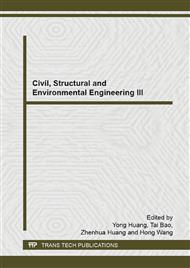p.2445
p.2449
p.2454
p.2459
p.2463
p.2467
p.2472
p.2476
p.2480
Integration of Environmental Education and Research for Multi-Disciplinary Studies
Abstract:
The current environmental education and research are scattered in different disciplines of studies, notably science, engineering, management, economics, politics, and law. This leads to some problems, such as the lack of sufficient understanding of other fields, narrow perspectives towards environmental issues and ill-informed decisions of different branches of the government, and the teaching of one field of the environmental studies based on a false, distorted, or outdated understanding of other fields. Restructuring course curriculum, multi-disciplinary research, and recruitment of college graduates from other fields of study are some of the suggestions.
Info:
Periodical:
Pages:
2463-2466
Citation:
Online since:
December 2014
Authors:
Price:
Сopyright:
© 2015 Trans Tech Publications Ltd. All Rights Reserved
Share:
Citation:


